Share
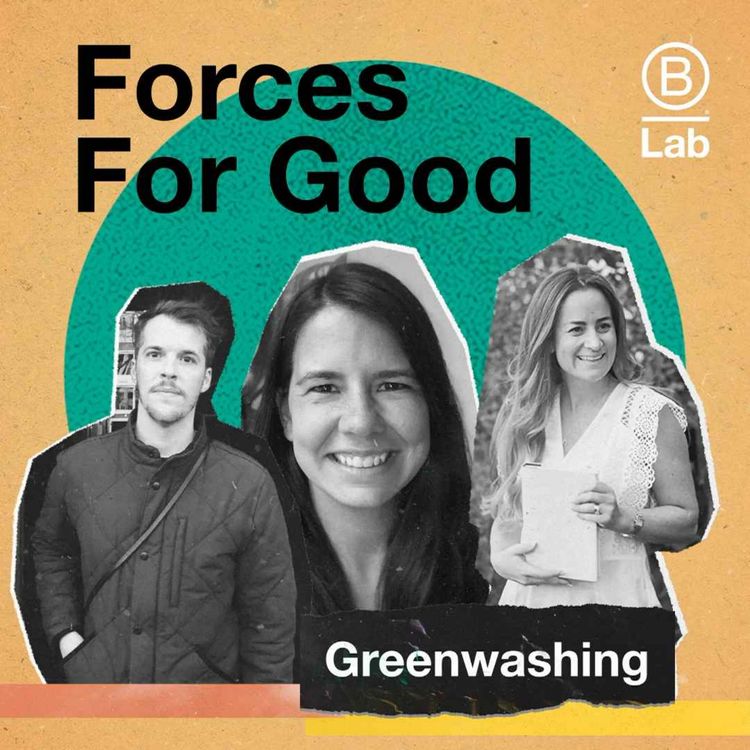
Forces for Good
How can business combat greenwashing?
Have you noticed an influx of products marketed as sustainable, eco-friendly, or recycled? You're not alone. As the global climate emergency accelerates and consumer awareness grows, businesses are increasingly leveraging green marketing to reach conscientious customers. But not all marketing is created equal.
On the show, experts explain the problem of "greenwashing," when marketing is designed to make consumers believe a business is doing more for the environment than they really are. We also talk about how to spot greenwashing and learn from companies that are telling transparent stories about their environmental footprint. In this episode we answer:
- What is the difference between green marketing and greenwashing?
- How have businesses and the advertising sector misled consumers about their environmental responsibility?
- How can these same players combat greenwashing?
- How can consumer awareness combat greenwashing?
In this episode, we discuss Patagonia as an exemplary B Corp. At the time of recording, Patagonia had not yet made their groundbreaking announcement transferring ownership to the Patagonia Purpose Trust and the Holdfast Collective, where every dollar not reinvested into Patagonia will be distributed as dividends to protect the planet. Patagonia’s unprecedented decision drives home the value of business taking concrete action to be a force for good.
Guests include:
Maria Correa, Head of Marketing and Communications at B Lab Europe
Luke Purdy, Director of Social Impact & Group Account Director at Wieden + Kennedy
Sharoni Rosenberg Amszynowski, author of “WTF is Purpose” and Executive Director at the PwC Chile Foundation
More episodes
View all episodes

8. How can we put our money to work for climate? with Seventh Generation
19:55||Season 4, Ep. 8Businesses have the opportunity to put their money where their mouth is and use everyday spending to further their sustainability goals. In this episode we’re sharing how to get started in climate finance, and why it might be one of the simplest sustainability moves you can make.My guests are Kylie Nealis, Senior Program Manager for Climate Justice, B Lab US and Canada and Kate Ogden, Head of Advocacy and Movement Building at B Corp, Seventh Generation.Climate finance provides an opportunity for large scale impact without massive changes to a company's production or supply chain. You can decarbonize your investments, choose partners who are as committed to sustainability as you are, and even buy greener insurance and retirement plans! Seventh Generation helped B Lab put together an inaugural Climate Finance Cohort dedicated to guiding B Corps on their climate finance journey.You can also find our Business Climate Finance Resource Guide here: https://pardot.bcorporation.net/business-climate-finance-guide-2024Learn more about B Lab at www.bcorporation.netViews and opinions expressed during the podcast are those of the individuals expressing them and do not necessarily reflect those of B Lab or Hueman Group Media.
7. How do we ensure everyone benefits from climate action?
22:04||Season 4, Ep. 7Climate action doesn’t happen alone: effective leaders understand that relationships are essential to success. Climate justice is about the ‘who’ and the ‘how,’ not just the ‘what.’ Getting started can be daunting. That’s why B Lab, along with partners and stakeholders, recently published the Principles for Partnership with Frontline Communities . Today’s guests were instrumental in writing and sharing these principles. They’ll tell us about how to implement them in your business and prove that purpose and profit are not mutually exclusive.Clementina Consens is Senior Associate, Climate Justice B Lab US and Canada. Clarenda Stanley, otherwise known as Farmer Cee, is the CEO of Green Heffa Farms. You can find the principles for partnership with Frontline Communities here: usca.bcorporation.net/principles-of-partnership-with-frontline-communitiesLearn more about B Lab at www.bcorporation.netViews and opinions expressed during the podcast are those of the individuals expressing them and do not necessarily reflect those of B Lab or Hueman Group Media.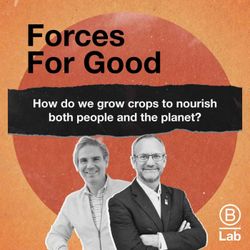
6. How do we grow crops to nourish both people and the planet?
18:32||Season 4, Ep. 6Agriculture and climate are inextricably linked. A healthy climate is key to producing healthy crops but modern agricultural practices often exacerbate climate change. There are also serious inequities between the Global North and the Global South built into our food systems. In today’s episode, we’re joined by two guests who understand this system and are working hard to improve it. Gonzalo Muñoz is the Co-Founder of both Sistema B and Ambition Loop. Sistema B is the Latin American branch of B Lab and Ambition Loop is a climate focused NGO based in Chile.Carlos Manuel Uribe is President at Flores El Capiro, a Colombia based flower grower and exporter. For more information on this topic please check out:COP28 Declaration on Sustainable Agriculture, Resilient Food Systems, and Climate Action: https://www.cop28.com/en/food-and-agricultureAmbitionLoop.Earth: https://www.ambitionloop.earth/agriculture-food-systemsLearn more about B Lab at www.bcorporation.netViews and opinions expressed during the podcast are those of the individuals expressing them and do not necessarily reflect those of B Lab or Hueman Group Media.
5. How can fashion become circular? with EILEEN FISHER and Closed Loop Partners
59:54||Season 4, Ep. 5The global fashion industry is responsible for as much as 10 percent of global greenhouse gas emissions and generates a massive amount of waste that often ends up in landfills.But it’s also an industry filled with innovation, and passionate, creative people who are ready to do business differently.We recorded this episode live during New York Climate Week at Remake World's Wear Your Values Weekend. Our incredible audience was filled with the next generation of fashion designers and solutions designers who made the most of sharing a room with our pair of powerhouse speakers:Carmen Gama is Director of Circular Design at B Corp, EILEEN FISHER, and Co-Founder of Make ANEEWLily Oswald is the Director of Growth and Strategy at Circular Services, a Closed Loop Partners Company. It's the largest privately-held recycling company in the US.It’s not a conversation to be missed! Learn more about B Lab at www.bcorporation.netViews and opinions expressed during the podcast are those of the individuals expressing them and do not necessarily reflect those of B Lab or Hueman Group Media.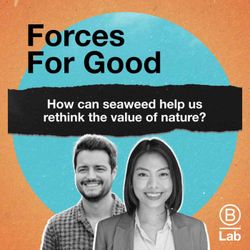
4. How can seaweed help us rethink the value of nature?
25:06||Season 4, Ep. 4Natural resources are not limitless, Yet, if used responsibly, nature-based solutions can provide innovative and regenerative alternatives to the world’s most harmful products. Did you know that plastic could be replaced with seaweed in the coming years? Hoa Doan, Head of Impact and Sustainability at Notpla, a London based B Corp, joins us to share how they make seaweed based packaging. Plus, learn how to build a nature-positive economy with Bosco Lliso, Nature Research Lead at The World Benchmarking Alliance. Don't miss this one!Learn more about B Lab at www.bcorporation.netViews and opinions expressed during the podcast are those of the individuals expressing them and do not necessarily reflect those of B Lab or Hueman Group Media.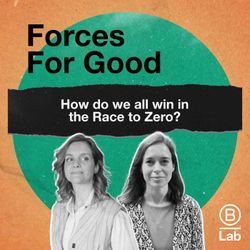
3. How do we all win in the Race to Zero?
22:16||Season 4, Ep. 3Environmental science covers some large and confusing topics. In this episode, we invite you to head back to the classroom with us to learn about decarbonization. In order to combat climate change, businesses must reduce their carbon and other greenhouse gas emissions to net zero and beyond. Jane Eisenhardt joins us from The UN High Level Climate Champions. She is the Engagement and Acceleration Manager to their campaign, Race to Zero. She’ll stress how critical speed is to decarbonization.Cecilia Plicco is Senior Director for Shared Value and Sustainability at B Corp Chiesi Pharmaceuticals. She'll share the innovative changes Chiesi has made to decrease emissions. Learn more about B Lab at www.bcorporation.netViews and opinions expressed during the podcast are those of the individuals expressing them and do not necessarily reflect those of B Lab or Hueman Group Media.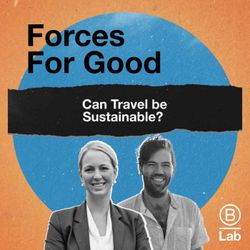
2. Can Travel be Sustainable?
21:53||Season 4, Ep. 2Travel is an impactful experience. It’s impactful on the traveler, on local communities, and on the environment. In this episode, we’ll tell you how the travel industry is driving efforts to champion positive change and tell you about personal changes you can make to travel more consciously. Our guests this episode are working at all levels of the industry to improve travel. Julie Cheetham is Chief Operating Officer at Travalyst, a global non profit with the ambition to change the impact of travel for good through partnerships with big industry players like Booking.com, Trip Advisor and Google. Rodrigo Atuesta is Co-Owner & CIO of Impulse Travel, a B Corp certified tour planner based in Colombia. They’re working with local communities and individuals to make travel more sustainable.Learn more about B Lab at www.bcorporation.netViews and opinions expressed during the podcast are those of the individuals expressing them and do not necessarily reflect those of B Lab or Hueman Group Media.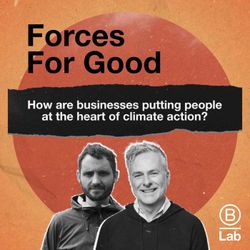
1. How are businesses putting people at the heart of climate action?
21:41||Season 4, Ep. 1Being a force for good means centering people and the planet. Joining us for our inaugural episode of season 4 we have two B Corps who are doing just that.Beauty and personal care brand, Faith in Nature was the first company to appoint nature to its board of directors. In the episode, Brand Director Simeon Rose tells us how the idea came about and how nature is represented in every decision the company makes.We’re also joined by Yerba Madre CEO, Ben Mand. He’ll tell us how his company fills their iconic yellow cans with Yerba Mate (a caffeinated tea like beverage) while forming relationships with farmers and suppliers. Yerba Madre’s relationships with people allow them to implement climate focused changes that make their whole supply chain more sustainable.In this episode we want to impress upon you that the climate fight is a holistic one. Throughout the season you’ll hear about groundbreaking climate solutions from companies big and small. All the while, we want you to remember that meaningful climate action is still possible but cannot happen without intentional action in all areas of a business!Learn more about B Lab at www.bcorporation.netViews and opinions expressed during the podcast are those of the individuals expressing them and do not necessarily reflect those of B Lab or Hueman Group Media.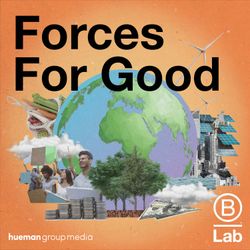
Forces For Good Season 4 Coming Soon
01:00||Season 4Forces for Good takes a hard look at how companies are helping to solve the biggest social and environmental challenges we face. On Season 4, we’re zeroing in on the environment and exploring sectors with the biggest climate impact: finance, fashion, travel, and more. As the B Corps in this season demonstrate, meaningful climate action is not out of reach! We’ll tell you how both businesses and individuals can make a difference and how environmental progress can’t be made without addressing governance and social challenges.Join host Irving Chan-Gomez for a brand new episode September 16, 2025.